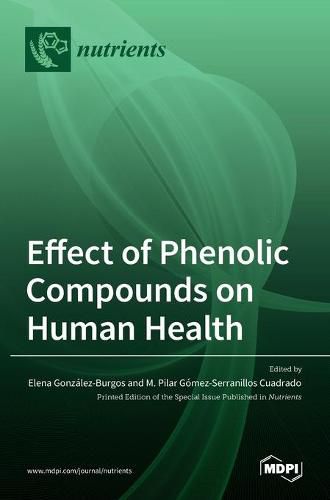Readings Newsletter
Become a Readings Member to make your shopping experience even easier.
Sign in or sign up for free!
You’re not far away from qualifying for FREE standard shipping within Australia
You’ve qualified for FREE standard shipping within Australia
The cart is loading…






This title is printed to order. This book may have been self-published. If so, we cannot guarantee the quality of the content. In the main most books will have gone through the editing process however some may not. We therefore suggest that you be aware of this before ordering this book. If in doubt check either the author or publisher’s details as we are unable to accept any returns unless they are faulty. Please contact us if you have any questions.
Phenolic compounds are non-essential dietary compounds that are found in many vegetables (i.e. onion, cabbage, broccoli and parsley), fruits (i.e. cherries, grapes, berries and pears), cereals and beverages (i.e. red wine, tea and chocolate). These heterogeneous compounds are produced as secondary metabolites. Structurally, these compounds are characterized by comprising an aromatic ring with one or more hydroxyl groups that can be classified into two groups: flavonoids and non-flavonoids. Phenolic compounds have received considerable attention for its health-promoting properties in many chronic disorders including diabetes, cardiovascular diseases, cancer and neurodegenerative diseases, among others. These health benefits are mainly attributed to its antioxidant properties. Phenolic compounds act as antioxidant by scavenging free radicals, metal chelation and endogenous antioxidant system upregulation (enzymatic antioxidants such as catalase, superoxide dismutase and glutathione peroxidase and non-enzymatic antioxidants such as glutathione).
The consumption of exogenous medicinal plants and food rich in phenolic compounds represent a promising therapeutically to prevent many chronic diseases and improve health.
This Special Issue entitled Effect of Phenolic Compounds on Human Health include research articles and review articles on phenolic compounds and its role in health (i.e. flavonoids and diabetes, polyphenols and liver diseases, polyphenols and obesity, polyphenols and cardiovascular diseases and polyphenols and neuroprotection).
$9.00 standard shipping within Australia
FREE standard shipping within Australia for orders over $100.00
Express & International shipping calculated at checkout
This title is printed to order. This book may have been self-published. If so, we cannot guarantee the quality of the content. In the main most books will have gone through the editing process however some may not. We therefore suggest that you be aware of this before ordering this book. If in doubt check either the author or publisher’s details as we are unable to accept any returns unless they are faulty. Please contact us if you have any questions.
Phenolic compounds are non-essential dietary compounds that are found in many vegetables (i.e. onion, cabbage, broccoli and parsley), fruits (i.e. cherries, grapes, berries and pears), cereals and beverages (i.e. red wine, tea and chocolate). These heterogeneous compounds are produced as secondary metabolites. Structurally, these compounds are characterized by comprising an aromatic ring with one or more hydroxyl groups that can be classified into two groups: flavonoids and non-flavonoids. Phenolic compounds have received considerable attention for its health-promoting properties in many chronic disorders including diabetes, cardiovascular diseases, cancer and neurodegenerative diseases, among others. These health benefits are mainly attributed to its antioxidant properties. Phenolic compounds act as antioxidant by scavenging free radicals, metal chelation and endogenous antioxidant system upregulation (enzymatic antioxidants such as catalase, superoxide dismutase and glutathione peroxidase and non-enzymatic antioxidants such as glutathione).
The consumption of exogenous medicinal plants and food rich in phenolic compounds represent a promising therapeutically to prevent many chronic diseases and improve health.
This Special Issue entitled Effect of Phenolic Compounds on Human Health include research articles and review articles on phenolic compounds and its role in health (i.e. flavonoids and diabetes, polyphenols and liver diseases, polyphenols and obesity, polyphenols and cardiovascular diseases and polyphenols and neuroprotection).